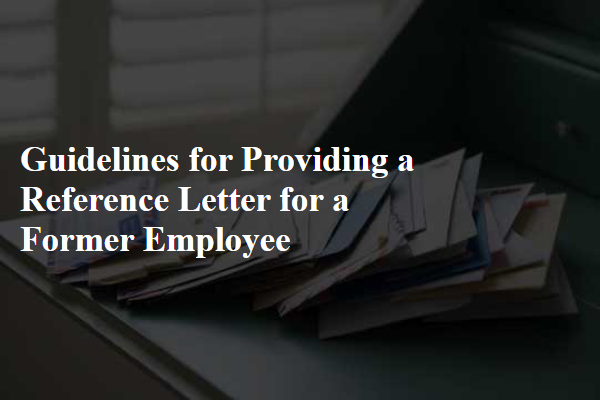
When providing a reference letter for a former employee, focus on specific examples of their skills, work ethic, and contributions to the organization. Highlight relevant achievements and provide an honest assessment of their abilities and character without divulging confidential information. Ensure the letter is clear, concise, and tailored to the prospective opportunity to maximize its impact.
Introduction to Reference Letter Guidelines
Providing a reference letter for a former employee requires clear and honest communication about their skills and work performance. It is important to include specific examples that highlight the employee's strengths and contributions.
The letter should begin with a brief introduction stating your relationship with the employee and the duration of employment. Include key attributes such as reliability, teamwork, and problem-solving abilities. Conclude by recommending the employee for future opportunities based on their demonstrated qualifications.
Purpose of the Reference Letter
What are the essential elements to include in a reference letter for a former employee? A well-crafted reference letter should highlight the employee's skills, achievements, and work ethic. Including specific examples enhances the credibility of the recommendation.
How should the tone and style be maintained in a reference letter? The tone must remain professional yet supportive, reflecting an honest appraisal. Clear, concise language helps convey the message effectively.
Why is it important to verify the accuracy of information in a reference letter? Providing truthful and accurate details prevents legal issues and maintains trustworthiness. Confirming facts with the former employee ensures reliability.
What details about the former employee's role should be emphasized? Job responsibilities, relevant accomplishments, and contributions to the company are key points. Emphasizing these highlights the candidate's suitability for future roles.
How can confidentiality and privacy be respected when writing a reference letter? Avoid disclosing sensitive personal information without consent. Focusing on professional attributes protects both parties' privacy.
Verifying the Request
When providing a reference letter for a former employee, focus on their key skills, work ethic, and contributions to the company. Include specific examples that demonstrate their reliability, professionalism, and accomplishments in previous roles. Ensure the tone remains positive, factual, and tailored to the job they are applying for.
Consent and Confidentiality
Providing a reference letter for a former employee requires an honest assessment of their skills, work ethic, and contributions to the organization. Include specific examples of achievements and qualities that highlight their professional capabilities. Maintain a positive and professional tone to support the employee's future career opportunities effectively.
Confirming Employment Details
Providing a reference letter for a former employee requires clear, honest communication and a focus on relevant professional qualities. Following established guidelines ensures the letter is useful and credible for future employers.
- Confirm Employment Details - Verify the employee's job title, dates of employment, and main responsibilities to establish accurate context.
- Highlight Key Skills and Achievements - Emphasize specific strengths, accomplishments, and contributions relevant to the prospective role.
- Maintain Professional Tone - Use formal, objective language and avoid personal opinions or unverifiable statements to preserve the letter's integrity.
Assessing Work Performance
| Guideline | Description |
|---|---|
| Obtain Consent | Always seek permission from the former employee before writing a reference letter. This ensures respect for privacy and compliance with data protection regulations. |
| Verify Employee Details | Confirm the former employee's job title, employment dates, and role responsibilities to provide accurate and reliable information. |
| Focus on Relevant Skills | Highlight key skills, achievements, and attributes related to the position the employee is applying for to increase the letter's effectiveness. |
| Maintain Professional Tone | Use formal and objective language. Avoid personal opinions and unverified claims to maintain credibility. |
| Include Specific Examples | Provide concrete instances of work performance, problem-solving abilities, or leadership qualities to demonstrate the employee's competencies. |
| Be Honest and Balanced | Offer truthful statements regarding strengths and areas for improvement without exaggeration or omission. |
| Limit Length | Keep the letter concise, typically one page, focusing on key points to ensure readability and impact. |
| Include Contact Information | Provide your professional contact details for verification or follow-up questions, enhancing trustworthiness. |
| Follow Company Policy | Adhere to your organization's guidelines regarding the issuance of employee references to avoid legal or ethical issues. |
Highlighting Key Skills and Achievements
Providing a reference letter for a former employee requires clarity and professionalism to support their career growth. A well-structured letter offers valuable insights into the employee's skills, work ethic, and character.
- Verify the Employee's Consent - Obtain explicit permission from the former employee before writing and sharing the reference letter.
- Focus on Relevant Skills - Highlight specific abilities and experiences that align with the prospective job or industry.
- Maintain Honesty and Positivity - Provide truthful information while emphasizing the employee's strengths and accomplishments.
Maintaining Objectivity and Professionalism
Providing a reference letter for a former employee involves clearly highlighting their skills, work ethic, and achievements. The letter should be concise, honest, and tailored to the specific role they are applying for.
Include specific examples of the employee's contributions and professional strengths, ensuring relevance to the new job opportunity. Maintain professionalism by avoiding personal opinions and focusing on verifiable information.
Legal and Ethical Considerations
Providing a reference letter for a former employee involves accurately reflecting their skills, work ethic, and accomplishments. Focus on specific examples that highlight their contributions and reliability.
Maintain a professional tone and ensure all information is truthful and verifiable. Avoid including personal opinions or unverifiable details to preserve the letter's credibility.
Closing and Contact Information
Providing a reference letter for a former employee requires clarity and professionalism to accurately reflect their qualifications and character. Effective reference letters support the employee's job search by highlighting relevant skills and experiences.
- Be Honest - Maintain integrity by giving truthful and fair evaluations of the employee's performance and behavior.
- Focus on Relevant Skills - Emphasize competencies and achievements that align with the prospective job or industry.
- Keep it Concise - Aim for a clear and brief letter that covers key points without unnecessary detail.
Ensure the letter is well-structured and free of errors to create a strong, professional impression.



Comments